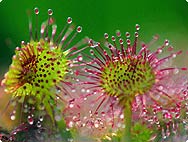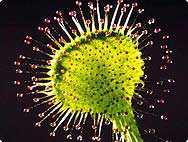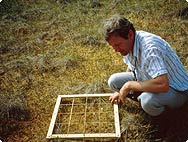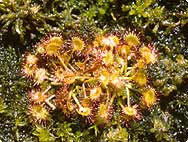A.Vogel search
When the internal search is activated, personal data such as your IP address is transmitted to our search engine Cludo. Data is thus transferred to a third country. Please click here if you want to display the internal search. You can find more information on data protection here: Privacy policy.
A.Vogel plant encyclopaedia
Drosera rotundifolia L.
Round-leafed Sundew
History

The name Drosera comes from the Greek words drósos and droseros meaning “dew” and “covered in dew” respectively. These words refer to the dewy excretion from glandular hairs on the edges of the leaves. In old herbals the plant is known as Rosa solis, meaning “dew of the sun”, hence Sundew. The Latin word, rotundifolia means “round-leafed”.
In the Nordic saga, the Edda, these dewdrops are understood to be the tears shed by the goddess Freya, who was unable to endure the separation from her spouse, Odin. The plant’s unique dewdrops, which do not evaporate in sunshine, are indeed a strange phenomenon which have long preoccupied humankind’s imagination. In the thirteenth century, alchemists attempted to manufacture gold from this secretion or an elixir for longevity entitled “Ad longam vitam suam”. They did not, however, succeed. The plant does not appear to have been known to those practising medicine in ancient Rome; it was, however used during the Middle Ages as a remedy for coughs, lung infections, whooping cough, consumption (tuberculosis), epilepsy, as well as kidney and bladder conditions.
In Sweden, a species of Drosera is used in combination with proteolytic enzymes to produce something known as “thick“ or “long milk“. The result is a refreshing, slightly sour-tasting, thick drink which stays fresh for long time.
Botanical characteristics

This insectivorous plant comprises one main root and auxiliary roots. The plant has striking, orbicular, hollow leaves on long stalks, depressed, laying flat on the ground. On the edge of the leaves and on the upper surface are numerous purple-coloured glandular hairs which each have a small shiny round gland at the top. These glands secret a thick, sticky fluid in order to attract and trap tiny insects. The glandular hairs gradually grow inwards towards their prey until the insect’s body is engulfed by the glandular heads which secrete a pepsin–like digestive fluid. The by-products from proteolysis are absorbed by the glandular hairs, leaving the insect’s chitinous shell behind on the leaf. Animal protein is necessary for carnivorous plants, since they usually grow in soil lacking in nutrients. If necessary, these plants are also capable of drawing nutrition from water, carbon dioxide and sunlight just like other normal plants; however, if forced to do this they will be weaker than otherwise.
Erect, thin flower-stems grow to a height of about 10 to 20 cm from the centre of the leaf rosette, these bear a one-sided, coiled, simple raceme prior to producing small, greenish-white flowers. The plant reproduces largely asexually from leaf buds.
The plant blooms from July to August.
Habitat

This fascinating little plant can be found growing in acidic moors, peat-rich soils and swamps in Arctic but also in mild zones of Europe, Asia and North America, occurring both in plains as well as at heights of up to 1.800 metres above sea-level. The steady decline of swampy areas in central Europe has had a highly adverse affect on the proliferation of Sundew and the plant is now a protected species. For this reason, the D. ramentaceae plant, which is indigenous to Madagascar, is used instead in pharmaceutical production. The plant is cultivated in special crops specifically intended for pharmaceutical manufacture.
Preparation

A.Vogel/Bioforce uses fresh Sundew harvested in Finland, where the plant is in abundance and is therefore not a protected species. The plant is collected while in bloom and then sent immediately via air freight to Switzerland, where it is combined with alcohol to produce a tincture. A.Vogel/Bioforce conducted a study in Finland which revealed that, on account of extensive areas of swamplands in this country,
D. rotundi¬folia was not an endangered plant and that the current harvesting of the plant in the wild was sustainable.